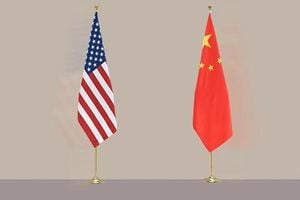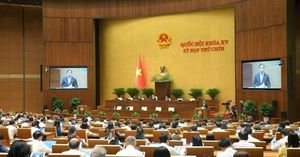Germany is bracing for the upcoming federal election on February 25, 2025, and pre-election polls indicate significant shifts in support for various political parties. Recent results from polls conducted by the Forschungsgruppe Wahlen and ZDF give insights not only about voter preferences but also about the potential composition of the next government.
According to ZDF's "Politbarometer Extra" published on February 20, just five days before the election, major parties are witnessing fluctuated support. The Christian Democratic Union (CDU) and its Bavarian counterpart, the Christian Social Union (CSU), have fallen below the 30-percent mark, now sitting at 28 percent—down two percentage points from previous polls. Meanwhile, the Alternative for Germany (AfD) has gained slightly, now polling at 21 percent, which reflects confidence among far-right voters.
The Social Democratic Party (SPD) remains steady at 16 percent, and the Greens hold firm at 14 percent, with both parties experiencing no change from earlier figures. Notably, The Left party has seen growth, increasing its support to 8 percent, signaling its secure position in the new Bundestag. Conversely, both the Free Democratic Party (FDP) and the new BSW party are struggling to cross the five-percent threshold required for parliamentary representation, with projections showing them at around 4.5 percent each.
This trend is troubling for the ruling parties, as serious doubts loom over their ability to form stable coalitions. The research indicates limited coalitional paths, with the possibility of the Union teaming up with either the SPD or the Greens, but no majority seems guaranteed. A two-party coalition between the Union and SPD would be on shaky ground, particularly due to the statistical overlap of margins of error noted by the polling organizations.
Poll results show the CDU/CSU still leads the preferences for the Chancellorship, with 32 percent of polled citizens supporting Friedrich Merz as the chancellor candidate. Robert Habeck from the Greens follows with 21 percent, and Olaf Scholz from the SPD gathers 18 percent support. Alice Weidel of AfD maintains 14 percent favor, evidencing a fragmented political preference among citizens.
What’s especially noteworthy is the low undecided rate compared to previous elections. Only 27 percent of respondents admit to uncertainty about whom they plan to vote for, indicating stronger resolve among potential voters. This appetite for decision aligns with the increased interest; 87 percent express strong engagement or concern for the upcoming election compared to 76 percent pre-2021 election.
Crucially, the voters have indicated key issues driving their choices: peace and security (45 percent) and economic stability (44 percent), with social justice closely behind at 39 percent. Alarmingly, climate issues seem less pressing, garnering only 22 percent support, which could significantly influence party strategies moving forward.
The polling data also suggested various combinations for potential government coalitions, with the possibility of either Red-Green-Red (SPD-Greens-Die Linke) or alternatives with the CDs and SPD, but each faces undeniable public resistance. A hypothetical black-green coalition would be met with hostility from 62 percent of respondents, reflecting the growing skepticism among the electorate.
The stakes grow higher as the election date approaches, with parties racing against time to solidify their platforms and capture undecided voters. Poll uncertainties are echoed by historical voting patterns—recall the last election where SPD and CDU saw much closer results (with SPD then at 25.7 percent and CDU at 24.2 percent), showcasing how volatile the political arena can still be.
With Olaf Scholz having lost the trust vote intentionally to pave the way for fresh elections, the disillusionment among voters might shape the political narrative for years to come. Governing parties must now face the repercussions of their dwindling approval ratings and public trust as they head to the polls.
The narrative surrounding the German Federal Election on February 25 is not just about party popularity but about the potential fate of Germany’s political stability. The upcoming vote holds the power to reshape alliances, challenge established norms, and redefine the future of policy-making within the country. The public's voice will be critically influential as they decide which path to endorse for the future.



